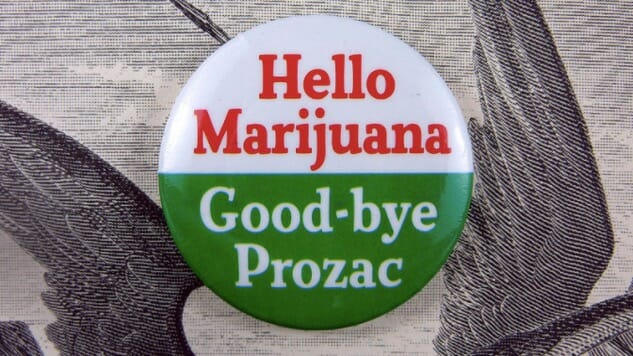Cannabis Connection: A Primer for Jeff Sessions on Marijuana and Opioids

“I see a line in the Washington Post today that I remember from the ‘80s: ‘Marijuana is a cure for opiate abuse,’” said Attorney General Jeff Sessions recently. ”’Give me a break. This is the kind of argument that’s been made out there to just … [it’s] almost a desperate attempt to defend the harmlessness of marijuana or even its benefits. I doubt that’s true.’”
This is yet another example of why cannabis regulation should be taken out of the hands of law enforcement and put exclusively under the purview of medical professionals. Even the most cursory examination of the evidence suggests that cannabis can likely play a role in pain management and opioid addiction recovery. The same law enforcement agencies that claim cannabis has absolutely no medical value (they really say that) also severely restricts research into its medical benefits since they claim they already know it has none (and they really say that), but consider what evidence researchers have compiled already.
Chronic Pain
In January 2017, the National Academies of Sciences, Engineering and Medicine released one of the most comprehensive studies into the health effects of recreational and therapeutic cannabis in the past decade. A 32-person committee of industry-leading professionals compiled the 440-page The Health Effects of Cannabis and Cannabinoids (cannabinoids are naturally occurring chemicals in cannabis) and put it through an intense 15-person peer-review process. In addition to skewering the federal government for its prohibitionist approach to cannabis research, the report found that chronic pain is one of three conditions for which the evidence most strongly suggests cannabis can help. (The other two were multiple sclerosis-related muscle spasms and chemotherapy-induced nausea and vomiting.) The authors said chronic pain is the most common reason people seek medical cannabis, and patients who do so are “more likely to experience a significant reduction in pain symptoms.”
Countless other studies confirm the same. In 2015, the Journal of the American Medical Association conducted a meta-analysis of 79 studies and found that cannabis effectively treats chronic pain with “30% or greater improvement in pain with cannabinoid compared with placebo.” In 2016, the same journal published “Opioids Out, Cannabis In” noting that more and more people are replacing opioids with cannabis in treating chronic and neuropathic pain.
Before diving into cannabis as a tool for addiction recovery, it is important to note that medical cannabis can also help people avoid opioids in the first place. The International Journal of Drug Policy in 2017 found that “cannabis is perceived to be an effective treatment for diverse conditions, with pain and mental health the most prominent … [with] cannabis as a substitute for prescription drugs (63%), particularly pharmaceutical opioids (30%).” A study published by The Journal of Pain in 2016 discovered that “cannabis use was associated with 64% lower opioid use in patients with chronic pain,” while a separate study in the same journal said, “The treatment of chronic pain with medicinal cannabis in this open-label, prospective cohort resulted in improved pain and functional outcomes, and a significant reduction in opioid use. Results suggest long-term benefit of cannabis treatment in this group of patients.”
These are just a few examples of studies that show the efficacy of treating chronic pain with cannabis, and countless public figures can attest to the benefits. Actor Patrick Stewart recently told British Esquire that he uses a cannabis-based topical spray to treat arthritic pain, a condition for which Republican Congressman Dana Rohrabacher also uses medical cannabis. Two-time Super Bowl-winning quarterback Jim McMahon said medical cannabis helps manage his pain and enabled him to kick his opioid habit, while an ESPN The Magazine poll in 2016 found that 61 percent of NFL players claimed they would consume fewer painkillers if cannabis was an allowed substance in the league and that they preferred cannabis (41 percnet) to painkillers (32 percent) as the preferred method for recovery and pain control.
For more information, put the words “cannabis chronic pain” in Google Scholar, ideally limiting the search to studies published in the last 10 years, and read for yourself.
Opioid Addiction Recovery
“When you see something like the opioid addiction crisis blossoming in so many states around this country,” said White House Press Secretary Sean Spicer about the Trump Administration’s pending crackdown on cannabis, “the last thing that we should be doing is encouraging people.”
No one thought Spicer won the State Science Fair, but he sounds here like a member of the Kyrie Irving flat earth society. Was he referencing the debunked gateway drug theory that even the Drug Enforcement Administration (DEA) now disavows? Or does he think cannabis is an opiate? Either way, the real science suggests cannabis is a tool to stem the opioid abuse epidemic.
-

-

-

-

-

-

-

-

-

-

-

-

-

-

-

-

-

-

-

-

-

-

-

-

-

-

-

-

-

-

-

-

-

-

-

-

-

-

-

-








































